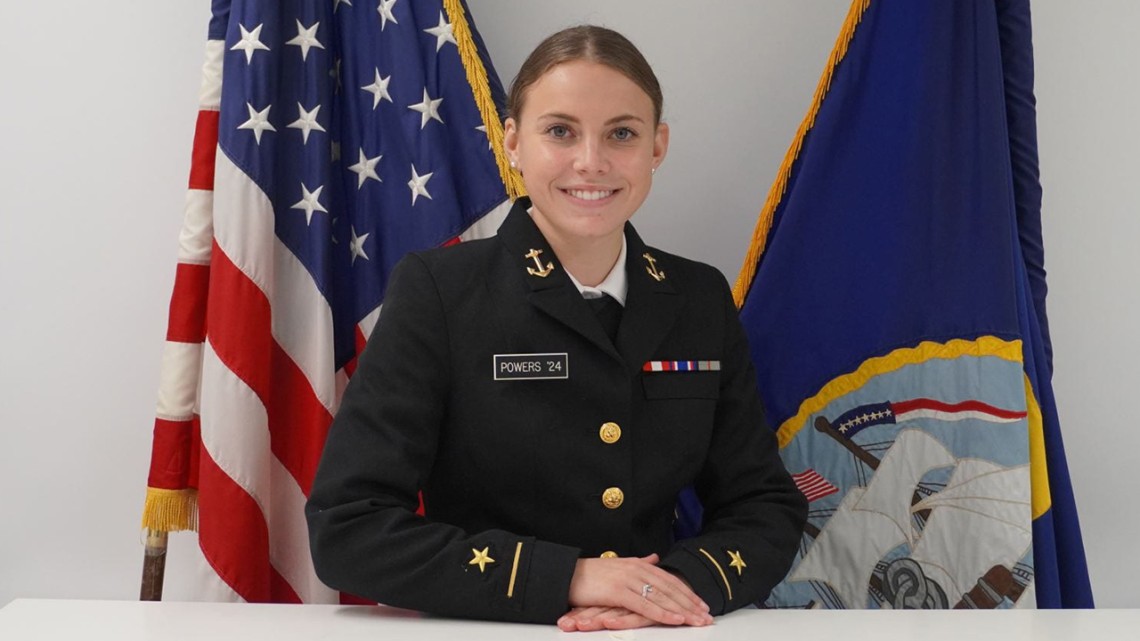
News directly from Cornell's colleges and centers
From ILR to a nuclear sub
By Julie Greco Amira Shimin '25
It’s not often that an undergraduate in the Cornell School of Industrial and Labor Relations embarks on a career working on a nuclear submarine, but that is precisely what Carly Powers ’24 will do after graduation this weekend.
Powers, a midshipman in Cornell’s Naval Reserve Officers Training Corps program, will leave on July 9 for Charleston, South Carolina, to attend the Navy Nuclear Power School, widely acknowledged as the most demanding academic program in the U.S. military.
“Being selected for the Navy Nuclear Power School is a significant achievement,” said Captain Scott Hardy, 33rd Commanding Officer & Professor of Naval Science at Cornell University. “It is one of the most difficult assignments to receive due to the academic requirements. Furthermore, Carly’s selection is distinct in that she didn't complete an engineering degree.”
According to Hardy, in addition to being an outstanding student, each applicant is required to complete multiple technical interviews and then sit for a final interview with the four-star admiral who runs the Navy nuclear program.
Powers will spend a year studying how to operate a nuclear reactor. Through the program, she will also learn to be a division officer on a submarine and train to qualify as an officer of the deck.
Raised in Alameda, California, by a military family, Powers was always fascinated by the possibility of a military career. She also valued the range of opportunities available to her in the military. So, when she received her Cornell and ROTC acceptances, she was thrilled.
Powers said she was particularly excited about the opportunity to participate in ROTC while having an ILR background.
“ILR is all about the relationship between an employer and employee," Powers said. "This is very similar to the officer/enlisted dynamic. ILR emphasizes treating workers with respect and dignity and giving them the power to voice concerns to their employer about aspects of the job that need to change. I hope to bring this point of view to the Navy.”
As a member of “NROTC,” as the program is known in the military, Powers takes Navy-specific classes, attends drills and does an hour of physical training with her squad each week. Altogether, she has devoted roughly 10 hours per week to the program and has her tuition paid in exchange for five years of future service in the Navy.
An economics minor who swims for the Cornell club team and is currently training for a half marathon, Powers spent her senior year as the brigade commander of the Cornell ROTC Tri-Service.
“Carly came to Cornell on an NROTC scholarship, which is very competitive, especially for top-tier schools like Cornell,” Hardy said. “And she finished her senior year as the brigade commanding officer, which is the highest position you can achieve while in ROTC.”
“She is an absolute superstar. She is kind, hardworking, humble and a natural leader who embodies ‘service before self.’ She reflects the best that our country has to offer, and the U.S. Navy and submarine community are very lucky to have her on the team.”
Read the full story on the ILR website.
Julie Greco is a senior communications specialist in the ILR School.
ILR student Amira Shimin ’25 contributed to this story.
Media Contact
Get Cornell news delivered right to your inbox.
Subscribe
